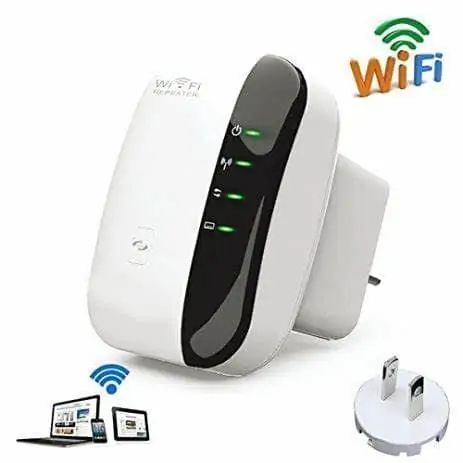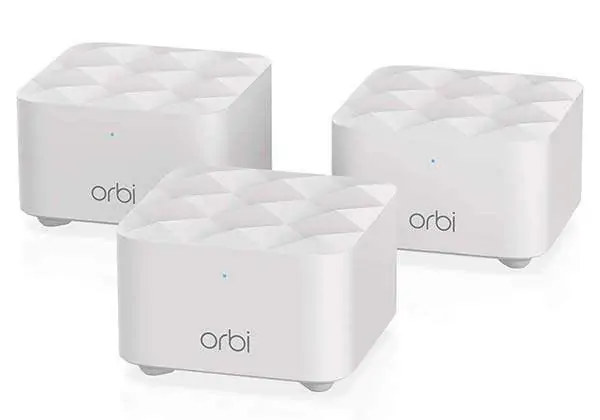Some links in this article are affiliate links and I may receive a small commission from purchases made off them at no extra cost to the reader.
Wi-Fi extenders/repeaters and Mesh Systems are two different products which can solve the problem of weak Wi-Fi in the home, but how exactly does each product work, what is the difference between them, and when is each product better in different circumstances?
In this article, we want to run through a comprehensive side by side comparison of the two products, comparing functionality, strengths and weaknesses of each, as well as when each product might be better. There are definitely scenarios where each product might be preferable to the other.
Here is a summary answer:
Wi-Fi extenders are the simpler and cheaper product which amplify the existing Wi-Fi signal from your router over short to medium distances with a single adapter plug. Wi-Fi Mesh systems are much more expensive and sophisticated products which consist a set of two or three nodes that are used to spread more comprehensive wireless coverage across a larger area.
Put differently, Wi-Fi extenders are entry level networking products to boost Wi-Fi coverage, whilst Mesh Systems are the most advanced (and often most expensive) widely available home networking products to boost wireless coverage in the home.
Their applicability in different circumstances varies accordingly, but generally you should go for the more expensive Mesh option if you really want much more comprehensive wireless coverage across an entire home for multiple users.
Let’s break down in more detail how each product works and when each might be better in different situations.
How Wi-Fi Extenders Work
Wi-Fi extenders (also called Wi-Fi Boosters/repeaters/amplifiers) are pretty much the simplest of home networking connectivity boosting products. They consist of a single adapter or plug which is simply plugged into a wall outlet between your router and wherever you are struggling with a weak Wi-Fi signal, preferably without obstructions and in clear sight of your main router.
See the short video below for a great demo of how to use them.
The extender then ideally simply captures and boosts the existing wireless signal from your router, improving the range of Wi-Fi so you get a better signal at distance from the router.
They are ideal if you have a problem with weak Wi-Fi for browsing and streaming perhaps one or two rooms away from the router, or in an apartment, and you could do with a better reception and more bandwidth for better streaming and faster loading pages.
Range extenders are simple, no nonsense products, the simplest of the all the signal boosting products (extenders/boosters, powerline adapters, mesh systems). They are also available very cheaply and can do a great job if you have a basic need to boost Wi-Fi over a shorter distance with only small or moderate obstructions in the way.

Here is an example of a simple Wi-Fi Booster/Range Extender product – the Super Boost Wi-Fi
Here are some popular Range Extenders models (click paid affiliate links below to view products on Amazon):
Netgear Wi-Fi Range Extender EX3700 – Cheaper lower end extender model, but still has decent average review scores from plenty of ratings. Easy setup, small discrete white plug design, and generally reported to have decent range. Also has an ethernet port to connect up a wired device if needed.
Rock Space Dual Band Wi-Fi Extender/Booster – A mid price range product with a very good average review score from plenty of reviews at the time of writing. Small, discrete black plug design, compatible with all Wi-Fi types, very easy setup.
TP Link AC1750 RE 450 Range Extender – Generally well reviewed, easy setup, and delivers very good throughput in a large number of cases. More towards the pricey end though for single plug Range Extenders.
How Wi-Fi Mesh Systems Work
Wi-Fi Mesh Systems are more advanced products, consisting of a set or kit of two or three “nodes” or pods. They basically do the same job as a range extender, but more reliably and over a much larger area, using more advanced technology.
You plug one node into your existing router with a cable; this then becomes you new main router. You then place the other one or two (or more) nodes around the home at strategic parts, just close enough that they can catch the existing signal from the main node, and just far enough away that they can boost the Wi-Fi signal to more remote parts of the house.
See the quick video below for a good demonstration of how Wi-Fi mesh ideally works:
They do not have absolute 100% reliability, and no wireless product ever will, since wireless RF waves will always weaken and degrade over distance, but they work far more effectively and over longer range than simple extender models do.
Because of this, they are ideal for larger environments such as big homes and offices, where coverage needs to be strong and reliable over a much larger area, as opposed to the short to medium distance range of an extender.
Reliability of mesh systems was patchy in the early days, but the technology has been around for a few years now and reliability and performance has significantly improved as updates have been issued by the manufacturers. The most popular models now work very effectively in most houses and are generally favorably reviewed online.

The Netgear Orbi RBK Mesh System (paid link) is an entry level kit which will spread reliable wireless coverage for an average 4 bed, 2 floor property up to 3000 sq ft. There are also more brands and models of mesh systems which can cover larger properties.
When is an Extender/Booster Better?
Range extenders are by far the simpler and cheaper problem to weak Wi-Fi, but by the same token they are only effective in certain situations. If you can get them to work reliably though, you can have your networking problems sorted very cheaply.
Here are some scenarios when a simpler single plug range extender model may be a good idea:
- You only need to boost the Wi-Fi over a short to medium distance, where there are not a lot of walls or other obstructions in the way.
- You only need to boost the Wi-Fi to a very specific device or corner of the house, like a home office. You don’t necessarily need a blazing fast reception to every single corner of the home.
- Range extenders are great for open plan apartments such as depicted in the extender video further above.
- Range extenders are great for people on a small budget – they are far cheaper than Mesh Systems.
When is a Wi-Fi Mesh System Better?
A Wi-Fi Mesh System can be seen as a more advanced version of a Wi-Fi extender, which uses more sophisticated technology and can cover a large area with better wireless coverage more effectively and consistently.
Mesh Systems for instance use what is known as a Dedicated Data Backbone – basically it’s own private channel on the airwaves – to transmit data between the nodes. This keeps it more free from interference and gives it an advantage over standard Wi-Fi extenders which just use the same Wi-Fi band(s) that other devices on the home network do.
Here are some scenarios when it is may make sense to get a Wi-Fi Mesh System over a Wi-Fi repeater:
- You live in a very large house, with multiple rooms and floors, and perhaps also quite a few walls the Wi-Fi needs to travel through.
- You have multiple people using the internet for browsing, streaming, downloading, working etc. and you need to spread better wireless coverage to all of them, not just to one select part of the house for one user (eg. home office). In other words, you need more comprehensive Wi-Fi coverage across a home for lots of users.
- You have explored other alternative like using a wireless powerline adapter, but this is not attractive because the wiring of your house doesn’t allow it or you need more coverage.
- You have tried range extenders and have struggled to get the signal to stay reliable and consistent over distance even with these.
- You have a decent budget to play with and want a real long term solution to really deliver good wireless coverage across an entire home, not just to one room or user.
Consider The Comparative Cost
A crucial factor to figure into whether you get a simpler Wi-Fi repeater plug or a Mesh system is simply the relative cost of the products, weighed up against your individual situations and networking needs. We have touched on this in the comparisons but the cost difference needs emphasizing.
In brief, Wi-Fi extenders can be very cheap at under $30, whilst Mesh Systems can be very expensive at $300 or more for a good kit.
Range extenders can be very cheap, no nonsense products, with many models under £/$50 and some models even under £/$20. In this sense they can be a great value for money purchase, as long as you can get them work given all the caveats we mentioned above about range and reliability.
Wi-Fi Mesh Systems on the other hand are often far more expensive products, with a good 3 node mesh system often running into several hundred pounds or dollars. They deliver a more effective and far reaching solution as a result – you get what you pay for.
So you may have to factor your budget into your decision on which to buy. Do you need just a simple, quick solution to boost Wi-Fi over a relatively short distance to a very specific area (eg. home office) in a more open plan environment with little in the way of obstructions? If so, then a range extender may fill your needs and there is no need to spend far more money on a Mesh System when it isn’t necessary.
On the other hand, if you are looking for a much broader solution to spread better Wi-Fi over a much larger area with more walls and floors in the way, then a Mesh System may be necessary despite the greater initial cost.
There is no need to necessarily spend all this money though if a Wi-Fi extender or even a powerline adapter will do the job you need it to for much less money.
Summary – Which is Better?
In summary then, if you have the money and you want really good Wi-Fi across an entire apartment or home, then a Mesh System can be a good investment for heavy internet use households especially. If you have very specific, shorter range networking needs, then a simpler Wi-Fi booster/extender can do the trick for much less money.
As a caveat, the reader might want to ask “When is neither better?”. If you are a keen online gamer, and you play a lot of fast paced online games where latency or lag is an issue, then it is best not to use Wi-Fi connections at all in any form, since they are prone to drop-outs and congestion, especially when lots of people use the internet at the same time in a house.
In these cases, we recommend a powerline adapter instead, since they allow you to get on a wired connection which is better all round for gamers from all angles.
See our other comparison articles between Mesh vs Powerline and Extenders vs Powerline, if you game a lot and feel this is the direction you need to go in.
However, for those that want to stay on a wireless connection no matter what for convenience and for portable devices, then your decision comes down to your budget combined with the range and comprehensiveness of the wireless coverage you need.
